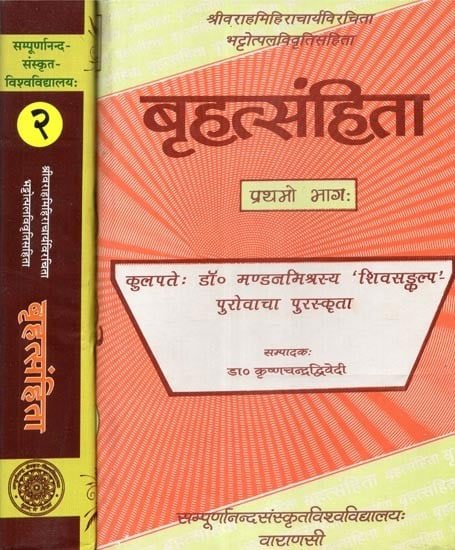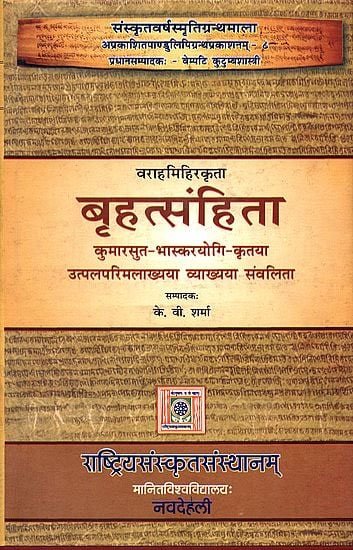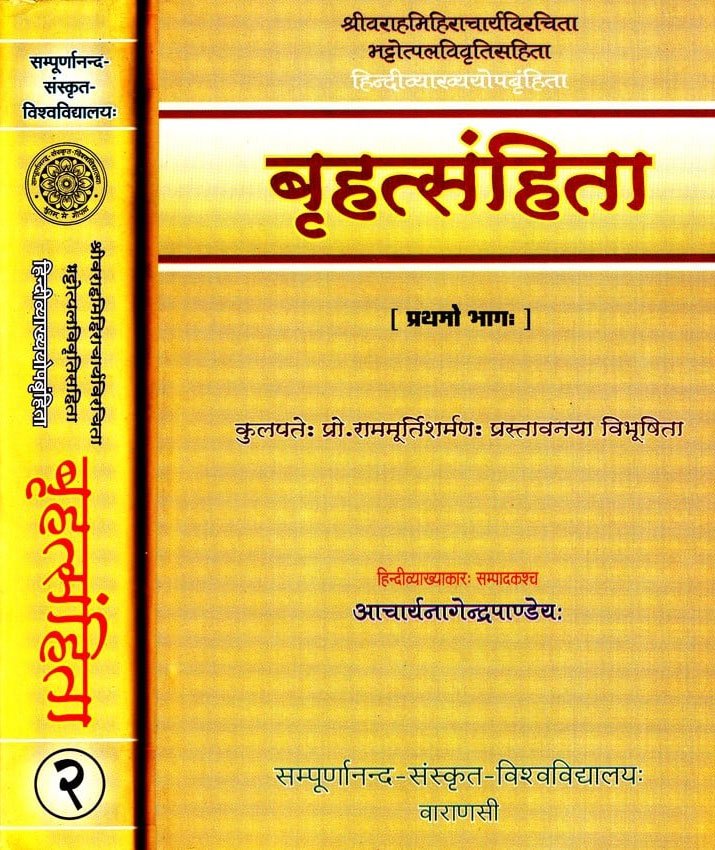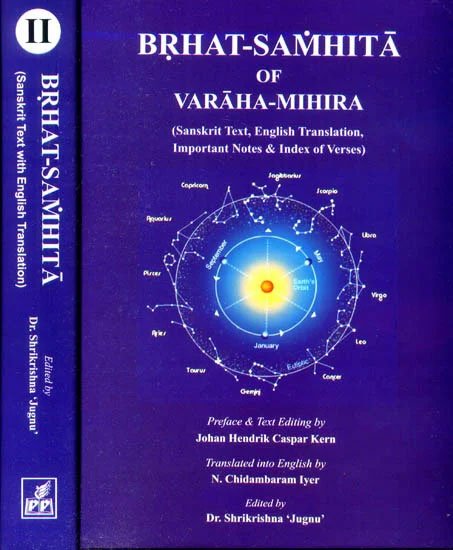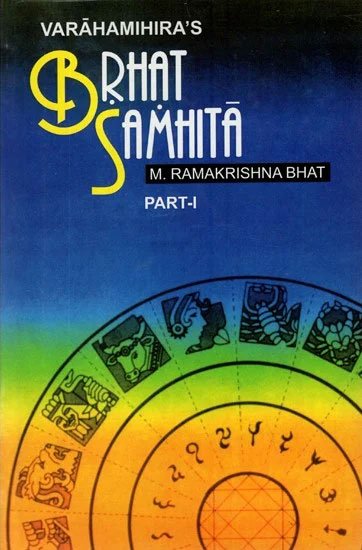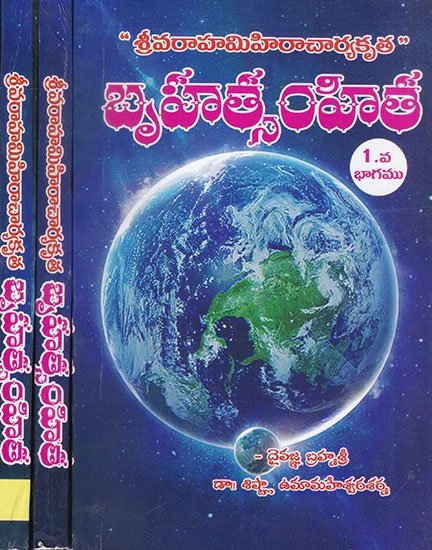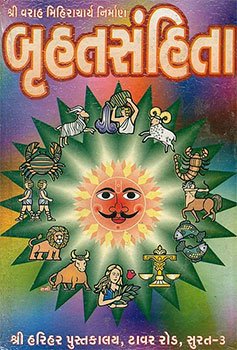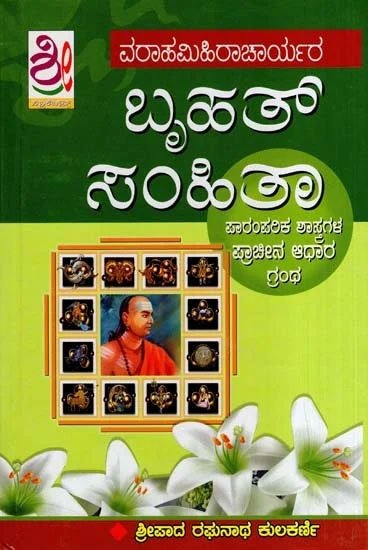Brihat-samhita [sanskrit]
26,560 words
The Sanskrit text of the Brihat-samhita from the 6th-century authored by Varaha Mihira in present-day Ujjain, India. It primarily deals with astrology and astronomy but is presented as an encyclopedia of knowledge.
Verse 46.12
मुनीनभिजितं ध्रुवं मघवतश्च भं संस्पृशच्छिखी घनविनाशकृत्कुशलकर्महा शोकदः ।
भुजङ्गमथ संस्पृशेद्भवति वृष्टिनाशो ध्रुवं क्षयं व्रजति विद्रुतो जनपदश्च बालाकुलः ॥ १२ ॥
[भुजङ्गभम्]
munīnabhijitaṃ dhruvaṃ maghavataśca bhaṃ saṃspṛśacchikhī ghanavināśakṛtkuśalakarmahā śokadaḥ |
bhujaṅgamatha saṃspṛśedbhavati vṛṣṭināśo dhruvaṃ kṣayaṃ vrajati vidruto janapadaśca bālākulaḥ || 12 ||
[bhujaṅgabham]
The Sanskrit text of Verse 46.12 is contained in the book Brihata Samhita (Sanskrit Text with Hindi Translation) by Pandit Achyutananda Jha. This book is available online or you could buy the latest edition:
Read online Buy now! The Sanskrit text by Pandit Achyutananda Jha (2001)
Glossary of Sanskrit terms
Note: This extracts Sanskrit terms and links to English definitions from the glossary, based on an experimental segmentation of verse (46.12). Some terms could be superfluous while some might not be mentioned. Click on the word to show English definitions.
Muni, Abhijit, Abhijita, Dhruvam, Dhruva, Maghavat, Maghavata, Bha, Sprishat, Shikhi, Shikhin, Ghana, Vinashakrit, Kushalakarma, Han, Shokat, Bhujangama, Tha, Bhavati, Bhavat, Bhavant, Vrishti, Ashas, Kshaya, Vrajat, Vidruta, Janapada, Bala, Akula,
Analysis of Sanskrit grammar
Note: this is an experimental feature and only shows the first possible analysis of the Sanskrit text (Verse 46.12). If the system was successful in segmenting the sentence, you will see of which words it is made up of, generally consisting of Nouns, Pronouns, Verbs, Participles and Indeclinables. Click on the link to show all possible derivations of the word.
- Line 1: “munīnabhijitaṃ dhruvaṃ maghavataśca bhaṃ saṃspṛśacchikhī ghanavināśakṛtkuśalakarmahā śokadaḥ ”
- munīn -
-
muni (noun, masculine)[accusative plural]
- abhijitam -
-
abhijita (noun, masculine)[adverb], [accusative single]abhijitā (noun, feminine)[adverb]abhijit (noun, masculine)[accusative single]
- dhruvam -
-
dhruvam (indeclinable)[indeclinable]dhruva (noun, masculine)[adverb], [accusative single]dhruva (noun, neuter)[adverb], [nominative single], [accusative single]dhruvā (noun, feminine)[adverb]
- maghavataś -
-
maghavat (noun, masculine)[accusative plural], [ablative single], [genitive single]maghavat (noun, neuter)[ablative single], [genitive single]maghavata (noun, masculine)[nominative single]
- ca -
-
ca (indeclinable conjunction)[indeclinable conjunction]ca (noun, masculine)[compound], [vocative single]ca (noun, neuter)[compound], [vocative single]
- bham -
-
bha (noun, masculine)[adverb], [accusative single]bha (noun, neuter)[adverb], [nominative single], [accusative single]bhā (noun, feminine)[adverb]bhā (noun, masculine)[adverb]
- saṃ -
-
sa (noun, neuter)[adverb], [nominative single], [accusative single]
- spṛśacch -
-
√spṛś -> spṛśat (participle, neuter)[nominative single from √spṛś class 6 verb], [vocative single from √spṛś class 6 verb], [accusative single from √spṛś class 6 verb]
- śikhī -
-
śikhī (noun, feminine)[compound], [nominative single]śikhi (noun, masculine)[nominative dual], [vocative dual], [accusative dual]śikhin (noun, masculine)[nominative single]
- ghana -
-
ghana (noun, masculine)[compound], [vocative single]ghana (noun, neuter)[compound], [vocative single]
- vināśakṛt -
-
vināśakṛt (noun, masculine)[compound], [adverb], [nominative single], [vocative single]vināśakṛt (noun, neuter)[compound], [adverb], [nominative single], [vocative single], [accusative single]
- kuśalakarma -
-
kuśalakarma (noun, masculine)[compound], [vocative single]kuśalakarma (noun, neuter)[compound], [vocative single]
- hā -
-
hā (noun, feminine)[nominative single]han (noun, masculine)[nominative single]√hā (verb class 1)[imperative active second single]
- śokad -
-
√śuk -> śokat (participle, neuter)[nominative single from √śuk class 1 verb], [vocative single from √śuk class 1 verb], [accusative single from √śuk class 1 verb]
- aḥ -
-
a (noun, masculine)[nominative single]ṛ (noun, feminine)[vocative single]ṛ (noun, masculine)[vocative single]
- Line 2: “bhujaṅgamatha saṃspṛśedbhavati vṛṣṭināśo dhruvaṃ kṣayaṃ vrajati vidruto janapadaśca bālākulaḥ || 12 |”
- bhujaṅgama -
-
bhujaṅgama (noun, masculine)[compound], [vocative single]bhujaṅgama (noun, neuter)[compound], [vocative single]
- tha -
-
tha (noun, masculine)[compound], [vocative single]tha (noun, neuter)[compound], [vocative single]
- saṃ -
-
sa (noun, neuter)[adverb], [nominative single], [accusative single]sam (Preverb)[Preverb]
- spṛśed -
-
√spṛś (verb class 6)[optative active third single]
- bhavati -
-
bhavatī (noun, feminine)[adverb], [vocative single]bhavat (noun, masculine)[locative single]bhavat (noun, neuter)[locative single]bhavant (pronoun, masculine)[locative single]bhavant (pronoun, neuter)[locative single]√bhū (verb class 1)[present active third single]
- vṛṣṭinā -
-
vṛṣṭi (noun, masculine)[instrumental single]vṛṣṭī (noun, neuter)[instrumental single]
- aśo* -
-
aśas (noun, masculine)[compound], [vocative single]aśas (noun, neuter)[compound], [nominative single], [vocative single], [accusative single]
- dhruvam -
-
dhruvam (indeclinable)[indeclinable]dhruva (noun, masculine)[adverb], [accusative single]dhruva (noun, neuter)[adverb], [nominative single], [accusative single]dhruvā (noun, feminine)[adverb]
- kṣayam -
-
kṣaya (noun, masculine)[adverb], [accusative single]kṣaya (noun, neuter)[adverb], [nominative single], [accusative single]kṣayā (noun, feminine)[adverb]
- vrajati -
-
√vraj -> vrajat (participle, masculine)[locative single from √vraj class 1 verb]√vraj -> vrajat (participle, neuter)[locative single from √vraj class 1 verb]√vraj (verb class 1)[present active third single]
- vidruto* -
-
vidruta (noun, masculine)[nominative single]
- janapadaś -
-
janapada (noun, masculine)[nominative single]
- ca -
-
ca (indeclinable conjunction)[indeclinable conjunction]ca (noun, masculine)[compound], [vocative single]ca (noun, neuter)[compound], [vocative single]
- bālā -
-
bāla (noun, masculine)[compound], [vocative single]bāla (noun, neuter)[compound], [vocative single]bālā (noun, feminine)[nominative single]
- akulaḥ -
-
akula (noun, masculine)[nominative single]
- Cannot analyse 12
Other editions:
Also see the following editions of the Sanskrit text or (alternative) English translations of the Verse 46.12
Brhatsamhita with the Commentary of Bhattotpala
by Krishna Chandra Dwivedi (2016)
Publisher: Sampurnanand Sanskrit University; 1229 pages;
Buy now!
Brihat Samhita with the Commentary of Utpalapatimala of Yogisvara
by K. V. Sharma (2012)
Publisher: Rashtriya Sanskrit Sansthan, Janakpuri; 754 pages; ISBN-10; 8186111360; ISBN-13: 9788186111369
Buy now!
Brihat Samhita (Hindi Translation)
by K. V. Sharma (2002)
Publisher: Sampurnanand Sanskrit University; 2359 pages; ISBN-13: 9789387890008.
Buy now!
Brhat Samhita (English translation)
by N. Chidambaram Iyer (2022)
Publisher: Parimal Publication Pvt. Ltd.; 801 pages; Edited by Dr. Shrikrishna Jugnu; ISBN-10: 8171104215; ISBN-13: 9788171104215.
Buy now!
Brhat Samhita (English with notes)
by M. Ramakrishna Bhat (2010)
Publisher: Motilal Banarsidas Publishers Pvt. Ltd.; 1155 pages; ISBN-10: 8120810600; ISBN-13: 9788120810600.
Buy now!
Brhat Samhita (Telugu translation)
by Sishtla Umamaheswara Sharma (2020)
Publisher: Mohan Publications, Andhra Pradesh; 846 pages.
Buy now!Preview of verse 46.12 in Kannada sript:
ಮುನೀನಭಿಜಿತಂ ಧ್ರುವಂ ಮಘವತಶ್ಚ ಭಂ ಸಂಸ್ಪೃಶಚ್ಛಿಖೀ ಘನವಿನಾಶಕೃತ್ಕುಶಲಕರ್ಮಹಾ ಶೋಕದಃ ।
ಭುಜಙ್ಗಮಥ ಸಂಸ್ಪೃಶೇದ್ಭವತಿ ವೃಷ್ಟಿನಾಶೋ ಧ್ರುವಂ ಕ್ಷಯಂ ವ್ರಜತಿ ವಿದ್ರುತೋ ಜನಪದಶ್ಚ ಬಾಲಾಕುಲಃ ॥ ೧೨ ॥
[ಭುಜಙ್ಗಭಮ್]
Brhat Samhita (Gujarati translation)
by - (2000)
Publisher: Shree Harihar Pustakalay, Surat; Author: Shri Varahamihira Acharya (શ્રી વરાહમિહીરાચાર્ય); 432 pages.
Buy now!Preview of verse 46.12 in Gujarati sript:
મુનીનભિજિતં ધ્રુવં મઘવતશ્ચ ભં સંસ્પૃશચ્છિખી ઘનવિનાશકૃત્કુશલકર્મહા શોકદઃ ।
ભુજઙ્ગમથ સંસ્પૃશેદ્ભવતિ વૃષ્ટિનાશો ધ્રુવં ક્ષયં વ્રજતિ વિદ્રુતો જનપદશ્ચ બાલાકુલઃ ॥ ૧૨ ॥
[ભુજઙ્ગભમ્]
Brhat Samhita (Kannada translation)
by Sripada Raghunatha Kulkarni (2021)
Publisher: Srinidhi Publications, Bangalore; 668 pages with illustrations.
Buy now!Preview of verse 46.12 in Kannada sript:
ಮುನೀನಭಿಜಿತಂ ಧ್ರುವಂ ಮಘವತಶ್ಚ ಭಂ ಸಂಸ್ಪೃಶಚ್ಛಿಖೀ ಘನವಿನಾಶಕೃತ್ಕುಶಲಕರ್ಮಹಾ ಶೋಕದಃ ।
ಭುಜಙ್ಗಮಥ ಸಂಸ್ಪೃಶೇದ್ಭವತಿ ವೃಷ್ಟಿನಾಶೋ ಧ್ರುವಂ ಕ್ಷಯಂ ವ್ರಜತಿ ವಿದ್ರುತೋ ಜನಪದಶ್ಚ ಬಾಲಾಕುಲಃ ॥ ೧೨ ॥
[ಭುಜಙ್ಗಭಮ್]
![Brihat-samhita [sanskrit] - book cover](/uploads/a/Brihat-Samhita-Sanskrit.jpg)
